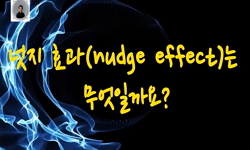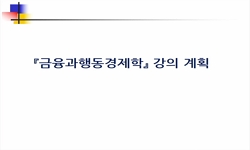다양한 학문분과와 접목되어 범죄와 형벌의 상응관계를 탐구하면서 범죄를 예방하고자 하는 형사정책은 최근 과학기술발전으로부터 등장한 새로운 일탈행위 및 기존 법익침해 위험이 양�...
http://chineseinput.net/에서 pinyin(병음)방식으로 중국어를 변환할 수 있습니다.
변환된 중국어를 복사하여 사용하시면 됩니다.
- 中文 을 입력하시려면 zhongwen을 입력하시고 space를누르시면됩니다.
- 北京 을 입력하시려면 beijing을 입력하시고 space를 누르시면 됩니다.
https://www.riss.kr/link?id=A108342267
- 저자
- 발행기관
- 학술지명
- 권호사항
-
발행연도
2022
-
작성언어
-
- 주제어
-
KDC
360
-
등재정보
KCI등재
-
자료형태
학술저널
- 발행기관 URL
-
수록면
35-65(31쪽)
- 제공처
-
0
상세조회 -
0
다운로드
부가정보
국문 초록 (Abstract)
최근 경제학에서 급부상하는 이론으로 행동경제학이 있다. 주류경제학인 신고전학파가 상정하는 ‘합리적 인간상’의 한계를 심리학적 관점에서 실험을 통해 파악하면서 인간은 합리적 이성의 인식뿐만 아니라 비합리적인 경험적·감정적인 인식을 동시에 가지고 행동한다는 것을 밝혀냈다. 이에 따라 이제 정부는 인간의 합리적 이성만이 아닌 제한적 합리성에 주목하여 정책을 펼치되 직접적이고 적극적인 개입을 하게 되면 간섭을 넘어 통제가 되므로, 합리적인 행동을 하도록 간접적으로 슬쩍 도와주는 역할에 주목하여야 한다고 한다. 이것이 바로 ‘자유온정주의’ 태도이고 이러한방향성으로 ‘넛지(nudge)’가 주목받고 있다.
행동경제학에서 분석한 인간의 이중인식체계는 합리적 인간상을 전제로 범죄라는 이익보다 형벌이라는 손실을 강화함으로써 범죄를 단념하게 하는 강벌주의적 형사정책만이 아닌, 합법적인 행위로 슬쩍 유도하는 넛지식의 형사정책을 재고하게끔한다. 이러한 형사정책은 국가가 방관하지 않으면서 종국적으로는 수범자가 자발적으로 규범준수행위로 나아가도록 한다는 점에서 적극적 일반예방이론과 맞닿아있다. 그리고 이러한 정책의 방향성은 새로운 낯선 환경이 거듭되는 현시대에서 스스로 자기 자신을 만드는 인간본성을 강조하는 ‘포스트휴머니즘’을 실천하는 방향성이될 것으로 기대해본다.
다양한 학문분과와 접목되어 범죄와 형벌의 상응관계를 탐구하면서 범죄를 예방하고자 하는 형사정책은 최근 과학기술발전으로부터 등장한 새로운 일탈행위 및 기존 법익침해 위험이 양적·질적으로 팽창한다는 불안감에서 엄벌주의를 넘어 강벌주의로 치닫고 있다. 그러나 이러한 중형주의 일변도의 형사정책은 오히려 동시대의 형사정책이 실패했다는 방증이다. 따라서 이제는 새로운 형사정책을 모색할 시점이다.
최근 경제학에서 급부상하는 이론으로 행동경제학이 있다. 주류경제학인 신고전학파가 상정하는 ‘합리적 인간상’의 한계를 심리학적 관점에서 실험을 통해 파악하면서 인간은 합리적 이성의 인식뿐만 아니라 비합리적인 경험적·감정적인 인식을 동시에 가지고 행동한다는 것을 밝혀냈다. 이에 따라 이제 정부는 인간의 합리적 이성만이 아닌 제한적 합리성에 주목하여 정책을 펼치되 직접적이고 적극적인 개입을 하게 되면 간섭을 넘어 통제가 되므로, 합리적인 행동을 하도록 간접적으로 슬쩍 도와주는 역할에 주목하여야 한다고 한다. 이것이 바로 ‘자유온정주의’ 태도이고 이러한방향성으로 ‘넛지(nudge)’가 주목받고 있다.
행동경제학에서 분석한 인간의 이중인식체계는 합리적 인간상을 전제로 범죄라는 이익보다 형벌이라는 손실을 강화함으로써 범죄를 단념하게 하는 강벌주의적 형사정책만이 아닌, 합법적인 행위로 슬쩍 유도하는 넛지식의 형사정책을 재고하게끔한다. 이러한 형사정책은 국가가 방관하지 않으면서 종국적으로는 수범자가 자발적으로 규범준수행위로 나아가도록 한다는 점에서 적극적 일반예방이론과 맞닿아있다. 그리고 이러한 정책의 방향성은 새로운 낯선 환경이 거듭되는 현시대에서 스스로 자기 자신을 만드는 인간본성을 강조하는 ‘포스트휴머니즘’을 실천하는 방향성이될 것으로 기대해본다.
다국어 초록 (Multilingual Abstract)
Behavioral economics is a theory that is rapidly emerging in economics. By grasping the limits of the ‘rational human image’ assumed by the neoclassical school of mainstream economics through experiments from a psychological point of view, it was revealed that humans act with both irrational empirical and emotional awareness as well as awareness of rational reason. Accordingly, it is said that the government should pay attention to the role of indirectly helping people to act rationally, since the government implements policies focusing on limited rationality, not just human rationality, but direct and active intervention leads to control beyond interference. This is the attitude of ‘free paternalism’, and ‘nudge’ is attracting attention in this direction.
The human dual perception system analyzed in behavioral economics is based on a rational human image, and not only a gangsteristic criminal policy that discourages crime by reinforcing the loss of punishment rather than the benefit of crime, but also a criminal nudge that gently induces legal action. to reconsider the policy. This criminal policy is in line with the positive general prevention theory in that it allows the prisoners to voluntarily follow the norms without the state neglecting them. And it is expected that the direction of this policy will be the direction of practicing ‘post-humanism’ that emphasizes the human nature of making oneself in the present age where new and unfamiliar environments are repeated.
Criminal policy, which seeks to prevent crime while exploring the correspondence between crime and punishment in connection with various academic disciplines, goes beyond strict punishmentism from the anxiety that the risks of new deviant acts and inf...
Criminal policy, which seeks to prevent crime while exploring the correspondence between crime and punishment in connection with various academic disciplines, goes beyond strict punishmentism from the anxiety that the risks of new deviant acts and infringement of existing legal interests that have emerged from recent scientific and technological developments will expand quantitatively and qualitatively. toward tyranny. However, this unilateral criminal policy is evidence that contemporary criminal policy has failed. Therefore, now is the time to seek a new criminal policy.
Behavioral economics is a theory that is rapidly emerging in economics. By grasping the limits of the ‘rational human image’ assumed by the neoclassical school of mainstream economics through experiments from a psychological point of view, it was revealed that humans act with both irrational empirical and emotional awareness as well as awareness of rational reason. Accordingly, it is said that the government should pay attention to the role of indirectly helping people to act rationally, since the government implements policies focusing on limited rationality, not just human rationality, but direct and active intervention leads to control beyond interference. This is the attitude of ‘free paternalism’, and ‘nudge’ is attracting attention in this direction.
The human dual perception system analyzed in behavioral economics is based on a rational human image, and not only a gangsteristic criminal policy that discourages crime by reinforcing the loss of punishment rather than the benefit of crime, but also a criminal nudge that gently induces legal action. to reconsider the policy. This criminal policy is in line with the positive general prevention theory in that it allows the prisoners to voluntarily follow the norms without the state neglecting them. And it is expected that the direction of this policy will be the direction of practicing ‘post-humanism’ that emphasizes the human nature of making oneself in the present age where new and unfamiliar environments are repeated.
목차 (Table of Contents)
- Ⅰ. 들어가는 말
- Ⅱ. 형사정책의 위기
- Ⅲ. 새로운 형사정책적 패러다임: 행동경제학
- Ⅳ. 형사정책적 패러다임 변화: 넛지를 활용한 자유온정주의
- Ⅰ. 들어가는 말
- Ⅱ. 형사정책의 위기
- Ⅲ. 새로운 형사정책적 패러다임: 행동경제학
- Ⅳ. 형사정책적 패러다임 변화: 넛지를 활용한 자유온정주의
동일학술지(권/호) 다른 논문
-
- 한국형사정책학회
- 김재한(Jae-Han Kim)
- 2022
- KCI등재
-
피해자 안전조치 담당 경찰관의 스마트워치 관련 직무 경험에 대한 현상학적 연구
- 한국형사정책학회
- 김하은(Ha Eun Kim)
- 2022
- KCI등재
-
- 한국형사정책학회
- 하태훈(Tae-Hoon Ha)
- 2022
- KCI등재
-
- 한국형사정책학회
- 안재경(Jaekyung Ahn)
- 2022
- KCI등재





 KCI
KCI 스콜라
스콜라






